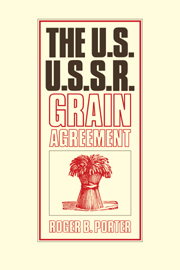Book contents
- Frontmatter
- Contents
- Foreword
- Preface
- List of acronyms used in the text
- 1 Introduction
- 2 U.S.–Soviet grain trade before 1974
- 3 The 1974 experience
- 4 The Russians return
- 5 First steps
- 6 A strategy emerges
- 7 Agreement to seek a long-term arrangement
- 8 Refining the details
- 9 Ebbing leverage: the waiting game
- 10 Evaluations
- 11 Reflections
- Epilogue
- Appendices
- Bibliography
- Index
- Frontmatter
- Contents
- Foreword
- Preface
- List of acronyms used in the text
- 1 Introduction
- 2 U.S.–Soviet grain trade before 1974
- 3 The 1974 experience
- 4 The Russians return
- 5 First steps
- 6 A strategy emerges
- 7 Agreement to seek a long-term arrangement
- 8 Refining the details
- 9 Ebbing leverage: the waiting game
- 10 Evaluations
- 11 Reflections
- Epilogue
- Appendices
- Bibliography
- Index
Summary
During the fall of 1979, USDA officials met with their Soviet counterparts to discuss Russian grain purchases during the fourth year of the agreement commencing in October 1979. As was standard practice, the Soviets did not request permission to import a specific amount. They left the initiative to their American counterparts. But Soviet import needs were well known. A poor 1979 harvest, 48 million tons (21 percent) short of production targets, led to Soviet plans to import 35 million tons during the next twelve months, meeting their maximum current port and transportation capacities. United States officials, expecting a bumper American crop, were anxious to enlarge the U.S. share of the Soviet market. On October 3, the Department of Agriculture formally gave the Soviets permission to purchase up to 25 million metric tons of wheat and corn during the fourth year of the agreement. The Soviets had purchased 15.7 million tons during the third year.
The Soviet invasion of Afghanistan on December 27, 1979, substantially altered U.S.–Soviet relations. President Carter reflected in an interview four days later: “The action of the Soviets has made a more dramatic change in my opinion of what the Soviets' ultimate goals are than anything they've done in the previous time that I've been in office.”
- Type
- Chapter
- Information
- The U.S.-U.S.S.R. Grain Agreement , pp. 119 - 138Publisher: Cambridge University PressPrint publication year: 1984

